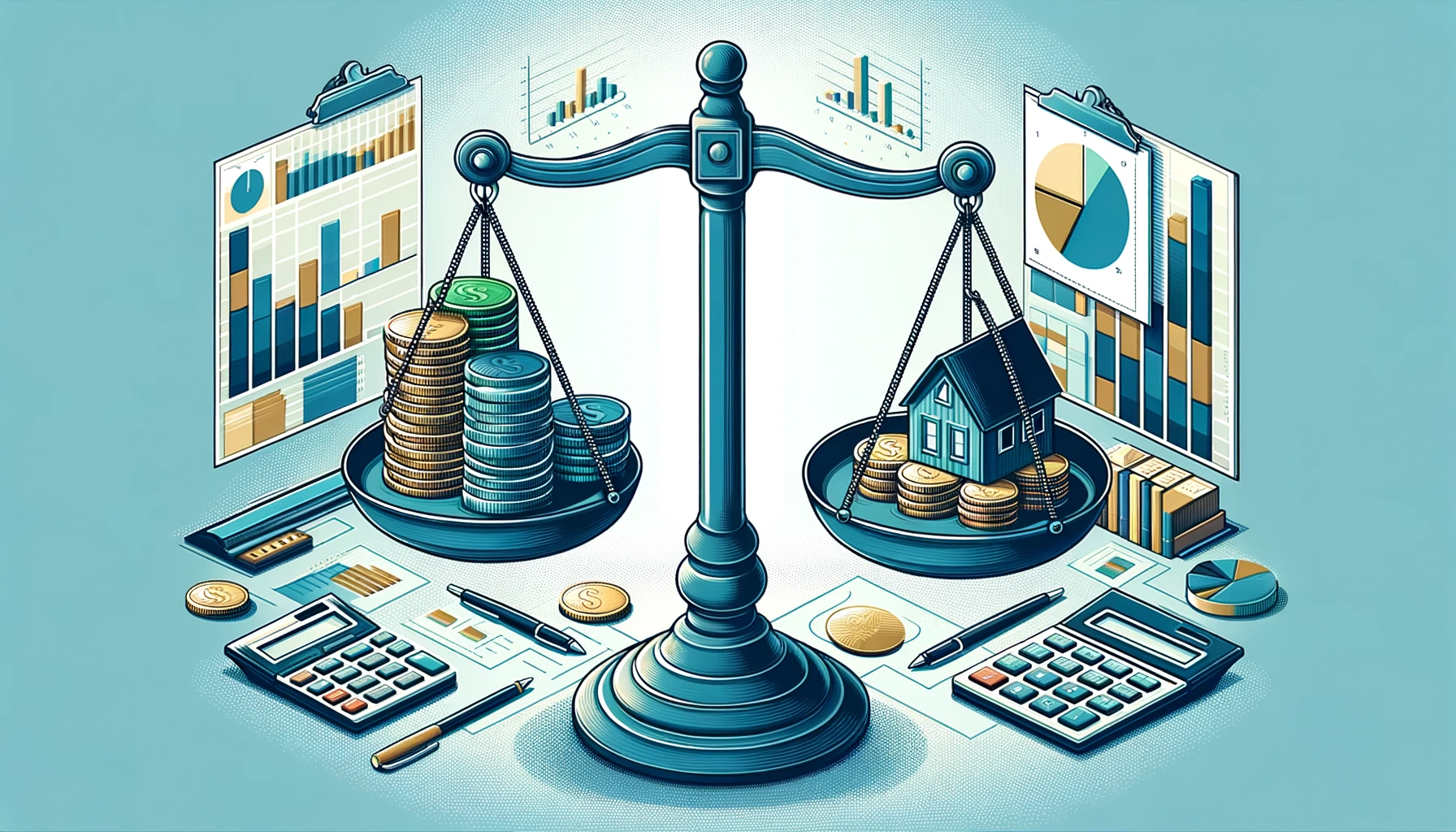
Wondering about the value of your business? Determining the worth of your company is crucial for various reasons, whether you plan to sell, attract investors, or make strategic decisions. Understanding how much your business is worth provides valuable insights into its financial health and potential growth opportunities.
Stay tuned as we delve into essential metrics, industry benchmarks, and valuation methods that can help you assess how much your business is worth effectively. Get ready to gain a deeper understanding of the valuation process and empower yourself with knowledge to make informed decisions for your business’s future.
Understanding Business Value

Importance
Understanding how much your business is worth is essential for making informed decisions. By knowing the value of your business, you can engage in strategic planning and facilitate growth effectively. Accurate valuation also plays a critical role in attracting potential investors or positioning your business for sale.
Business valuation serves various purposes beyond just determining its monetary value. It is crucial for activities like mergers, acquisitions, partnerships, or even internal restructuring. Valuation helps establish the fair market value of a business entity and provides valuable insights into its financial health and future potential.
Purpose
Market conditions significantly influence the value of a business. Economic factors, industry trends, and competitive landscape all contribute to shaping the market value of a company. Being aware of these external factors allows you to assess your business’s worth accurately and make informed decisions based on current market dynamics.
Evaluating earnings potential is paramount when determining your business’s value. Factors such as revenue growth rates, profit margins, and future performance projections directly impact how your enterprise is valued in the market. A higher earnings potential often translates to a more substantial overall business worth due to increased profitability prospects.
Business Valuation Methods
Asset-Based

Asset-based valuation assesses the total worth of a business by considering both tangible and intangible assets it owns. Tangible assets like real estate and equipment, along with intangible ones such as intellectual property, significantly impact the overall value of the business. This approach involves calculating the net value of all assets after deducting liabilities to determine the company’s value accurately.
When conducting an asset-based valuation, businesses need to account for all their assets comprehensively. For instance, a manufacturing company would include its machinery, inventory, patents, and trademarks in the assessment. By subtracting debts and other obligations from this total asset value, companies can gauge how much they are worth based on what they own.
- Pros:
- Provides a clear understanding of tangible and intangible assets’ contributions to business value.
- Offers a straightforward method for determining net worth by subtracting liabilities.
- Cons:
- May undervalue businesses with significant intangible assets not fully reflected on balance sheets.
- Does not consider future earning potential or market trends impacting business value.
Cash Flow Analysis
Cash flow analysis focuses on evaluating how money moves in and out of a company over time. A positive cash flow indicates that a business is generating more money than it spends regularly, showcasing financial stability that can enhance its overall value. By examining cash flow patterns closely, businesses can make informed projections about future profitability levels while also gaining insights into their current market position.
In practice, analyzing cash flows helps investors understand how efficiently a company manages its finances. For example, if a retail store consistently generates healthy profits but struggles with managing expenses leading to negative cash flows due to high overhead costs or slow-paying customers.
- Key Information:
- Positive cash flow signifies financial health.
- Allows estimation of future profitability through historical data analysis.
- Examples: 1. Retail stores tracking daily sales revenue against operating expenses for better financial planning. 2. Tech startups monitoring monthly burn rate (expenses) compared to revenue generation for sustainability.
Quick Estimation Techniques
Revenue Guides
Revenue guides are useful tools for estimating a business’s value based on its annual sales or revenue figures. By utilizing industry benchmarks or historical data, businesses can quickly gauge their worth. These guides offer a rapid assessment of the company’s overall value without delving into complex valuation methods.
When using revenue guides, it is essential to consider various factors such as market trends, growth potential, and profitability margins. For instance, if a business in the retail sector has consistent revenue growth exceeding industry averages, it may indicate higher value compared to competitors with stagnant sales figures. This technique provides a straightforward way to get an initial estimate of how much a business is worth.
- Simplifies valuation process
- Provides quick assessment based on financial performance
- Offers insights into relative value within the industry
Industry Comparisons
Comparing your business to similar companies within the same industry is another effective method for determining its value. Analyzing financial ratios like profit margins and return on investment can reveal valuable insights about competitiveness and market position. By evaluating growth rates and market share alongside industry peers, businesses can gain a clearer understanding of their worth.
Industry comparisons allow businesses to benchmark themselves against competitors and identify areas for improvement or differentiation. For example, if a tech startup shows robust growth rates compared to established players in the sector, it may command a higher valuation due to its potential for future success. This technique helps contextualize a business’s value within its specific market landscape.
- Enables evaluation of competitive positioning
- Identifies strengths and weaknesses relative to industry norms
- Helps determine fair market value by considering peer performance
Detailed Valuation Approaches

Discounted Cash Flow
Discounted cash flow (DCF) is a method used to determine the present value of future cash flows. It takes into account the time value of money and risk factors to estimate the worth of a business accurately. By analyzing projected cash flows, DCF offers a thorough valuation approach that considers various financial aspects.
When using DCF, one can calculate how much their business is worth by forecasting future earnings and discounting them back to their present value. For example, if a company expects significant growth in profits over the next five years, DCF will reflect this potential increase in its valuation. This detailed approach provides a holistic view of the business’s financial health and prospects.
EBITDA Significance
EBITDA (Earnings Before Interest, Taxes, Depreciation, and Amortization) plays a crucial role in determining a company’s value. It serves as an essential metric for valuation because it showcases operational profitability without factoring non-operating expenses like interest or taxes. As such, EBITDA is often considered as an approximation for cash flow since it focuses solely on core business operations.
For instance, when assessing how much your business is worth using EBITDA, you would look at its ability to generate profits from its primary activities without being clouded by external financial elements. By understanding EBITDA’s significance in valuing businesses, owners can gauge their company’s true earning potential more accurately.
Market Value Determination

Assessing Market Growth
Evaluating market growth potential is crucial in determining how much is my business worth. Factors such as demand trends, customer behavior, and industry forecasts play a significant role in this assessment. For instance, if a business operates in an industry with a rapidly expanding market, its valuation is likely to be higher due to the increased opportunities for revenue growth.
Considering the potential for market expansion can provide valuable insights into the future value of a business. By analyzing how the market is expected to evolve over time and understanding consumer preferences, businesses can better assess their current value. This forward-looking approach helps investors and stakeholders understand the long-term sustainability and profitability of a company.
Expansion Projections
When estimating how much is my business worth, projecting future expansion plans becomes essential. Understanding how scalable a business is and forecasting the impact of expansion initiatives are critical components of valuation. By outlining detailed expansion projections, businesses can showcase their growth potential and attractiveness to potential buyers or investors.
Assessing scalability not only influences current value but also sheds light on long-term value creation opportunities. Businesses that demonstrate strong potential for sustainable growth through strategic expansions are often perceived as more valuable in the eyes of investors. Therefore, thorough evaluation of expansion strategies plays a pivotal role in determining the overall worth of a business.
Professional Valuation Assistance
For Funding
When determining how much is my business worth, seeking professional valuation assistance is crucial, especially when looking for funding. Investors and lenders heavily rely on accurate valuations to evaluate the potential of an investment and associated risks. A well-supported valuation not only enhances credibility but also significantly boosts the chances of securing funding. By having a clear understanding of your business’s value, you can present a compelling case to investors or financial institutions.
- Accurate valuations are essential for securing funding.
- Investors use valuations to assess opportunities and risks.
- Well-supported valuations increase credibility with investors and lenders.
Investor Negotiations
In investor negotiations and equity discussions, knowing how much your business is worth plays a pivotal role. A fair and transparent valuation process helps build trust between you as the business owner and potential investors. Understanding your business’s true value strengthens your position during negotiations, enabling you to advocate effectively for fair terms that align with the actual worth of your company.
- Business valuation is critical in investor negotiations.
- Transparent valuations foster trust with potential investors.
- Knowing your business’s value enhances negotiating power.
Valuing Service Businesses

Cash Flow Evaluation
Evaluating cash flow patterns is essential when determining how much your business is worth. A positive cash flow and consistent revenue streams play a significant role in increasing the overall value of a business. By analyzing cash flow, you gain valuable insights into the financial stability and long-term sustainability of your company. Understanding these aspects can help you make informed decisions regarding the valuation of your service-based business.
Cash Flow Evaluation:
- Positive cash flow enhances business value
- Consistent revenue streams are crucial for valuation
- Insights into financial health and sustainability provided by evaluating cash flow
Strategies for Small Businesses
For small businesses, utilizing valuation methods can be instrumental in identifying areas that need improvement or growth opportunities. Knowing how much your business is worth enables small business owners to set realistic goals, attract potential investors, or plan an exit strategy effectively. This understanding empowers strategic decision-making processes within the organization.
Strategies for Small Businesses:
- Valuation helps identify areas for improvement and growth
- Setting realistic goals based on valuation results
- Empowering decision-making through understanding the business’s value
Interpreting Valuation Results
Understanding Assets Value
Assessing the value of a business involves evaluating both tangible and intangible assets. Tangible assets include equipment, property, and inventory. Intangible assets such as intellectual property, brand reputation, and customer relationships are equally important. For instance, a well-known brand can significantly increase a company’s overall value.
Understanding the worth of these assets provides a holistic view of the business’s value. Intellectual property like patents or trademarks can be highly valuable in certain industries. Similarly, strong customer relationships built over time can enhance the perceived worth of a company beyond just its physical possessions.
Comparing to Peers
Comparing your business to similar companies in the market is crucial for determining its value accurately. Analyzing financial performance metrics like revenue growth and profit margins helps gauge how your business stacks up against competitors. Market share also plays a vital role in assessing relative strength.
Post-Valuation Considerations

Growth Strategies
Business valuation plays a crucial role in determining how much is my business worth by aiding in the development of growth strategies. By identifying opportunities for expansion or diversification, businesses can enhance their overall value. Valuation also guides decision-making processes by highlighting areas within the company that have the potential for growth. For example, if a valuation reveals that a particular product line is performing exceptionally well, the company may choose to invest more resources into expanding that specific area.
Moreover, valuations may need adjustments based on changing market conditions or industry trends. Regularly reviewing and updating valuations ensures their accuracy and relevance over time. These adjustments account for various factors that can impact the value of a business as it evolves. For instance, if there is a sudden shift in consumer preferences towards eco-friendly products within an industry, this trend must be considered when adjusting the business’s valuation to reflect its potential impact on future earnings.
Adjusting Valuations
Adjusting valuations allows businesses to stay current with market dynamics and maintain an accurate reflection of their worth. By considering factors such as economic conditions, technological advancements, or regulatory changes, companies can ensure that their valuations remain up-to-date and reflective of their true value. For instance, if there is increased competition in the market leading to pricing pressures on products or services offered by a business, adjustments may be necessary to align the valuation with these new challenges.
Regularly updating valuations also helps businesses make informed decisions regarding investments or strategic initiatives based on real-time data about their financial health and standing in the marketplace.
Final Remarks
Understanding the intricacies of business valuation is crucial for anyone seeking to determine the worth of their enterprise. By exploring various valuation methods, from quick estimations to detailed approaches, one can gain a comprehensive insight into the factors influencing market value. Seeking professional assistance can provide valuable guidance in navigating the complexities of valuing a business, especially for service-based enterprises. Interpreting valuation results accurately and considering post-valuation implications are essential steps towards making informed decisions regarding the future of the business.
For those embarking on the journey of determining their business’s value, continuous learning and engagement with experts in the field will be instrumental in ensuring sound decision-making. Stay informed, seek guidance when needed, and approach business valuation as a strategic tool for growth and sustainability.
Related News:
Featured Image courtesy of DALL-E by ChatGPT
